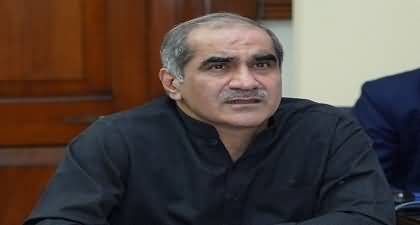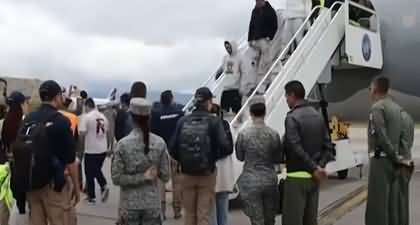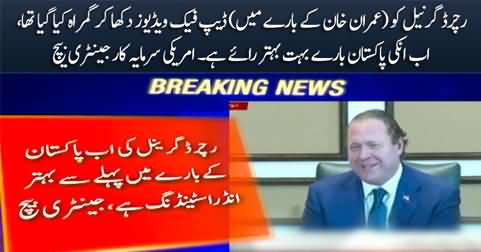
Joint Statement by President Obama and Prime Minister Nawaz Sharif
At the invitation of President Obama, Prime Minister Sharif paid an official visit to Washington from October 20 to 23, 2013, marking the commitment of both Leaders to strengthen U.S.-Pakistan relations and advance shared interests in a stable, secure, and prosperous Pakistan and region.
President Obama and Prime Minister Sharif held wide-ranging discussions at the White House today about the importance of a U.S.-Pakistan partnership built on a foundation of mutual interest and respect. They acknowledged the substantial progress in the bilateral relationship over the last year and noted its resilient nature. The President and the Prime Minister affirmed U.S.-Pakistan friendship and close cooperation and recalled our positive contributions to international peace and security at crucial junctures during the Cold War and in the post-9/11 period. Reaffirming the strong relationship between the two countries, they stressed that our enduring partnership is based on the principles of respect for sovereignty and territorial integrity. They expressed their conviction that an enduring U.S.-Pakistan partnership is vital to regional and international security and recognized their shared interest in Pakistan’s economic growth and development, regional stability, and mutually determined measures to counter terrorism. President Obama conveyed appreciation for Pakistan’s internal and regional security challenges and affirmed that a peaceful, prosperous, and democratic Pakistan was an essential partner for the United States in the advancement of shared goals of peace, security, and socio-economic development in South Asia.
Shared Democratic Values
President Obama congratulated Prime Minister Sharif on being elected to office in the historic May elections, observing that the smooth democratic transition between two elected governments was a milestone for the democratic institutions in Pakistan. Affirming that both the United States and Pakistan are committed to democracy, human rights, freedom, and respect for international law, President Obama and Prime Minister Sharif dedicated themselves to deepening and enhancing the relationship between the peoples of the United States and Pakistan.
An Enduring Partnership
Both leaders welcomed the resumption of the U.S.-Pakistan Strategic Dialogue and reaffirmed its importance as the suitable framework for guiding the bilateral relationship. They emphasized that the dialogue should focus on people-centered initiatives and on results-oriented outcomes in support of the long-term stability, prosperity, and security of both the United States and Pakistan. They discussed the forthcoming Ministerial-level Strategic Dialogue, which Secretary Kerry would be hosting in Washington by March 2014. They also decided on the strategic priorities for the five working groups including: 1) Law Enforcement and Counterterrorism; 2) Economics and Finance; 3) Energy; 4) Security, Strategic Stability, and Non-Proliferation; and 5) the Defense Consultative Group.
The Leaders underscored the importance of further reinforcing the positive momentum in the bilateral relationship by promoting people-to-people contacts, including parliamentary exchanges. In this context, they also lauded the valuable role played by the Pakistani Diaspora in the United States in bringing the two countries together.
Economic Growth, Energy, and Social Sector Cooperation
Prime Minister Sharif highlighted his government’s efforts for economic growth, energy security, social development, and good governance. He thanked President Obama for the important contribution the United States has made in supporting Pakistan’s development efforts, including through the Enhanced Partnership with Pakistan Act of 2009. The Leaders discussed the Prime Minister’s deep commitment to increasing economic growth in Pakistan and to taking the steps necessary to put Pakistan on a path of long-term economic growth and stability. The President gave the assurance that the United States would strongly support efforts to enlarge and strengthen Pakistan’s economy, particularly in the energy sector, as this sector could play a critical role in ensuring the well-being and prosperity of the people of Pakistan.
President Obama reiterated U.S. support for ongoing programs to strengthen Pakistan’s economy and increased agricultural productivity. He also pledged continued support to help Pakistan address its energy shortfall, a key focus of U.S. assistance to Pakistan. Noting that resolving Pakistan’s energy crisis is a top priority for his government, Prime Minister Sharif expressed his commitment to expand power generation capacity, promote the efficient use of energy resources, and better utilize Pakistan’s domestic natural gas, hydroelectric, and renewable resources.
The Leaders emphasized that both sides should work together on a range of options to enable Pakistan to overcome its energy deficiencies and that both sides will hold further discussions in the working groups on Energy and Security, Strategic Stability, and Non-Proliferation. President Obama noted that U.S. assistance in the energy sector has added over 1,000 megawatts of power to Pakistan’s national grid, helping over 16 million Pakistanis. Prime Minister Sharif expressed appreciation for U.S. assistance toward the construction and rehabilitation of Gomal Zam, Satpara, Mangla, and Tarbela dams and the modernization of Guddu, Jamshoro, and Muzaffargarh power plants, and the Leaders highlighted the recent Overseas Private Investment Corporation (OPIC) loan for private sector wind development in Sindh. Prime Minister Sharif also thanked President Obama for U.S. support toward the Diamer-Bhasha and Dasu dams, which are critical to meeting Pakistan’s long-term energy and water needs. He also welcomed the announcement of funding for the Kaitu Weir Hydroelectric and Irrigation Project, which will increase Pakistan’s overall energy production, expand the amount of irrigated land, and provide livelihood options for residents of North Waziristan. The two Leaders looked forward to the meeting of the Working Group on Energy in November 2013, followed by a U.S.-organized Pakistani trade mission to Houston, Texas, to meet with major U.S. energy companies. In preparation for this working group, the two Leaders instructed their teams to develop a U.S. technical assistance program to support the development of Pakistan’s domestic natural gas reserves.
President Obama also reaffirmed U.S. support in key areas such as economic growth, agriculture, health, and education. The President highlighted that the United States remains Pakistan’s largest export market and one of the largest sources of foreign direct investment in Pakistan. The Prime Minister welcomed U.S. support to private sector-led growth and job creation in Pakistan, including through the Pakistan Private Investment Initiative (PPII) launched at the jointly sponsored Pakistan Business Opportunities Conference in Dubai in June 2013, which would make a matching investment of $100 million in the development and expansion of small and medium size businesses in Pakistan.
Prime Minister Sharif highlighted his keen interest in expanding bilateral trade and investment, and the two Leaders reaffirmed their commitment to this end. The two Leaders pledged to continue this discussion through the Strategic Dialogue process and noted that the United States-Pakistan Trade and Investment Framework Agreement (TIFA) is the key vehicle to promote U.S. investments in Pakistan. The President announced that United States Trade Representative Michael Froman would invite his counterpart to Washington for a TIFA Council meeting, at which these issues could be discussed in greater depth. The two Leaders directed their senior officials to develop a joint action plan to expand trade and investment flows between the United States and Pakistan over the next five years and expressed their intention to hold the third U.S.-Pakistan Economic Opportunities Conference in the next year. Both leaders affirmed their commitment to the multilateral trading system and to a successful 9th Ministerial Conference of the World Trade Organization in Bali.
Expressing satisfaction at the implementation of the 2003 Agreement on Science and Technology Cooperation between the United States and Pakistan and acknowledging its significance in promoting a decade of intensified cooperation between the two countries, the two Leaders decided to extend the agreement through 2018. They also discussed the importance of investing in Pakistan’s growing youth population through high-quality education programs. President Obama reiterated that U.S. assistance for education in Pakistan has built or rehabilitated over 600 schools, provided 12,000 university scholarships to Pakistani students, trained more than 10,000 teachers and school administrators, and provided more U.S.-funded scholarships under the prestigious Fulbright program in Pakistan than anywhere else in the world. These investments help prepare Pakistan’s younger generation to enter the job market and become leaders in their country and communities, and the two Leaders expressed their shared intent to further promote educational and research opportunities for Pakistani students, scholars, and researchers in U.S. institutions. President Obama also highlighted the announcement of the USAID Reading Initiative, which is aimed at helping over 3.2 million Pakistani school children learn to read.
Defense Cooperation
Taking note of the robust bilateral defense cooperation between their two countries -- including recent military engagements, exercises, and consultations on regional security -- President Obama and Prime Minister Sharif expressed satisfaction with the positive momentum achieved in defense relations and reaffirmed that this partnership should continue to grow and endure. The two Leaders noted with satisfaction that the Ground Lines of Communication (GLOCs) are facilitating the movement of U.S. and International Security Assistance Force (ISAF) cargo through Pakistan.
Prime Minister Sharif conveyed appreciation for U.S. security assistance in support of Pakistan’s counterterrorism, counterinsurgency, counternarcotics, and maritime security operations and expressed hope of broadening bilateral defense cooperation in areas that serve mutual interest. To bolster these efforts, the United States plans to continue providing assistance and support, including training and equipment to Pakistan’s military and security services. The two Leaders decided to strengthen their cooperation, including in regional maritime security. President Obama noted Pakistan’s positive efforts to counter improvised explosive devices (IEDs) and both leaders resolved to continue working together to disrupt the threat posed by these devices. President Obama commended the resolve of the government and people of Pakistan, armed forces, and law enforcement agencies to defeat terrorists and praised Pakistan for its military campaign. They shared their mutual conviction that a stable and peaceful Pakistan-Afghanistan border was important for the success of counterterrorism, counterinsurgency, and counter-IED efforts, and they underscored the critical significance of effective border coordination mechanisms between Pakistan and Afghanistan in achieving these objectives.
Counterterrorism
Both President Obama and Prime Minister Sharif condemned terrorism in all its forms and manifestations. The Prime Minister shared his perspective on effective counterterrorism cooperation to achieve the mutual objective of defeating terrorism. President Obama thanked Prime Minister Sharif for Pakistan’s efforts to help defeat al-Qa’ida, and both Leaders expressed their deep appreciation for the sacrifices of military personnel and civilians in the fight against terrorism and extremism. The two Leaders emphasized that no country’s territory should be used to destabilize its neighbors. Further, the Leaders noted that extremism and terrorism represent a common challenge for humanity and that the solution lies in collaboration and joint efforts by the international community.
Nonproliferation, Nuclear Security and Strategic Stability
President Obama and Prime Minister Sharif emphasized that nuclear terrorism is one of the most challenging threats to international security. President Obama appreciated Pakistan’s constructive engagement with the Nuclear Security Summit process and its cooperation with the International Atomic Energy Agency and other international forums, while acknowledging Pakistan’s efforts to improve its strategic trade controls and enhance its engagement with multilateral export regimes. Looking ahead to the 2014 Nuclear Security Summit at the Hague, the two Leaders reaffirmed the commitments of the 2012 Nuclear Security Summit in Seoul, strengthening nuclear security; reducing the threat of nuclear terrorism; preventing terrorists, criminals, or other unauthorized actors from acquiring nuclear materials; and working closely for the objectives of the Summit. They acknowledged the importance of regional balance and stability in South Asia and pursuing increased transparency and uninterrupted dialogue in support of peaceful resolutions of all outstanding issues. Prime Minister Sharif affirmed Pakistan’s support for the universal objectives of non-proliferation and disarmament. The two Leaders underscored that all sides should continuously act with maximum restraint and work jointly toward strengthening strategic stability in South Asia. Prime Minister Sharif expressed Pakistan’s desire to join the multilateral export regimes. President Obama reiterated his confidence in Pakistan’s commitment and dedication to nuclear security and recognized that Pakistan is fully engaged with the international community on nuclear safety and security issues.
Regional Cooperation
President Obama and Prime Minister Sharif renewed their determination to promote peace, stability, and transparency throughout the region. They committed to work together to combat international terrorism and extremism and to promote peace and prosperity.
The two leaders welcomed progress on the Turkmenistan-Afghanistan-Pakistan-India (TAPI) pipeline project, and tasked the Energy Working Group to explore possible further U.S. support for the Central Asia-South Asia electricity line, CASA-1000, in close collaboration with the World Bank. Prime Minister Sharif expressed appreciation for the development and rehabilitation by the U.S. government of roads in Pakistan’s border areas, including the four major transit routes between Afghanistan and Pakistan. Both sides emphasized the need to maintain and enhance the GLOCs’ relevant infrastructure, and Prime Minister Sharif welcomed the recently signed agreement between Pakistan’s National Highway Authority and USAID to rehabilitate 247 kilometers of the Kalat-Chaman road, which will help pave the way for regional trade by linking Kandahar to Quetta and to the port of Karachi.
The President and Prime Minister reaffirmed that a peaceful, stable, independent, and united Afghanistan is in the interest of the region. They welcomed the ongoing security transition in Afghanistan and Afghan-led preparations for next April's presidential elections. The two Leaders recognized the important role of countries in the region in supporting Afghanistan’s progress toward stability and prosperity and stressed that continued engagement by the international community in Afghanistan’s economic and social development and reconstruction would be essential in ensuring the long-term security and prosperity of the Afghan people. Prime Minister Sharif also underlined that the support of the international community in the repatriation of Afghan refugees from Pakistan and their reintegration in Afghanistan was of critical importance to Pakistan. The two Leaders emphasized their support for a policy of non-interference in Afghanistan.
The Leaders affirmed their commitment to the Afghan-led and Afghan-owned peace and reconciliation process as the surest way to end violence and bring lasting stability to Afghanistan and the region. Acknowledging Pakistan’s efforts to support an inclusive reconciliation process in which Afghans determine the future of their country, both Leaders called on the Taliban to join the political process and enter into dialogue with the Afghan government.
The two Leaders stressed that improvement in Pakistan-India bilateral relations would greatly enhance prospects for lasting regional peace, stability, and prosperity, as it would significantly benefit the lives of citizens on both sides of the border. In this context, President Obama welcomed recent engagements between Prime Minister Sharif and Prime Minister Singh and expressed hope that this would mark the beginning of a sustained dialogue process between the two neighbors, aimed at building lasting peace in South Asia and resolving all outstanding territorial and other disputes through peaceful means. President Obama welcomed steps taken by Pakistan and India to improve their economic relations, including by exploring electricity and gas supply agreements, developing a reciprocal visa regime, and expanding bilateral trade.
Conclusion
President Obama thanked the Prime Minister for visiting the United States, and both Leaders committed themselves to remaining in close contact and to continuing their efforts to build a strong, broad-based, long-term, and enduring relationship between the United States and Pakistan that should serve as a foundation for the stability and prosperity of the region and around the globe.
Source
Top Rated Posts ....
 Tiktoker Imsha Rehman's first video statement after her private videos leaked
Tiktoker Imsha Rehman's first video statement after her private videos leaked
 Khawaja Saad Rafique's important tweet regarding PECA act
Khawaja Saad Rafique's important tweet regarding PECA act
 Agar Imran Khan Ki Rehai Ke Liye America Se Call I Tau? Mohsin Naqvi's interesting gesture on question
Agar Imran Khan Ki Rehai Ke Liye America Se Call I Tau? Mohsin Naqvi's interesting gesture on question
 What will happen if all immigrants leave USA? A BBC URDU's report
What will happen if all immigrants leave USA? A BBC URDU's report
 Viral video: Chinese company allows employees to take as much cash as they can count for bonus
Viral video: Chinese company allows employees to take as much cash as they can count for bonus
 Faisal Chaudhry vs Shehla Raza | Verbal clash over Imran Khan's jail meal
Faisal Chaudhry vs Shehla Raza | Verbal clash over Imran Khan's jail meal
Follow Us on Social Media
Advertisement
Popular Posts
Tiktoker Imsha Rehman's first video statement after her private videos leaked
Views 3170 | February 01, 2025Richard Grenell was misled by showing deep fake videos - US Investor Gentry Beach
Views 1313 | January 29, 2025Chahat Fateh Ali Khan responds to Mathira's allegations
Views 1295 | January 29, 2025Video: American Khatoon Ke Dar Se Larka Flat Chor Kar Kese Bhaga?
Views 1261 | January 30, 2025Khawaja Saad Rafique's important tweet regarding PECA act
Views 1198 | February 02, 2025Karachi: American woman who came to marry a young man reaches Nursery
Views 1181 | January 30, 2025Video: A girl performing as Mermaid in Chinese aquarium attacked by a huge fish
Views 1133 | January 31, 2025Agar Imran Khan Ki Rehai Ke Liye America Se Call I Tau? Mohsin Naqvi's interesting gesture on question
Views 1009 | February 01, 2025Mohammad Malick's address to protest against PECA Act
Views 932 | January 31, 2025What will happen if all immigrants leave USA? A BBC URDU's report
Views 860 | February 02, 2025Comments...










